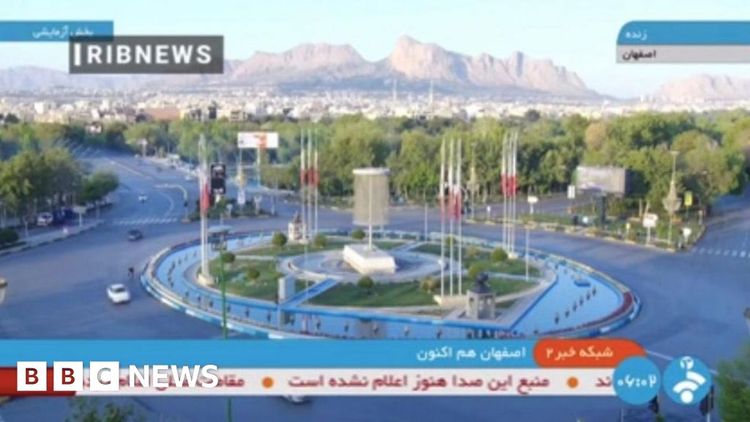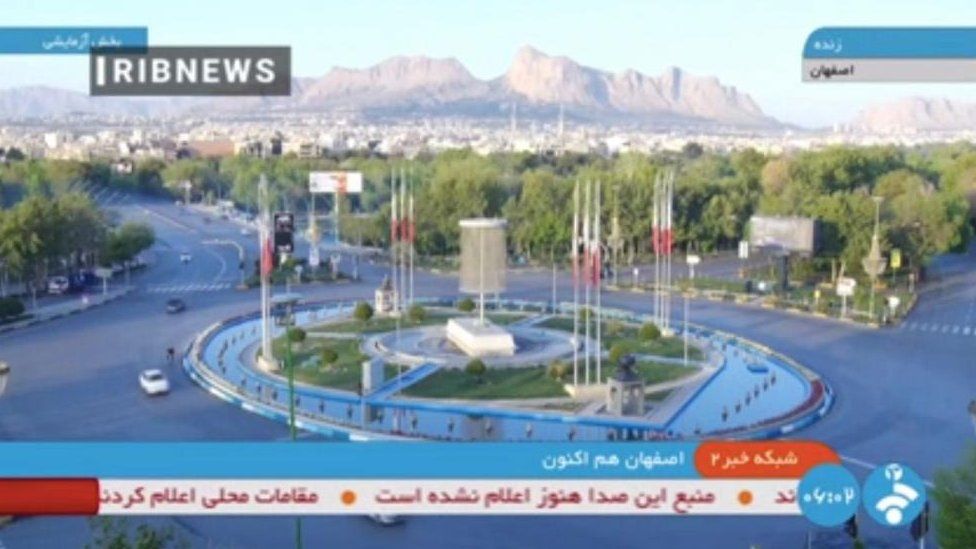What we know about Israel's overnight attack on Iran

The television network of the Iranian government showed Isfahan in their broadcast, revealing no indications of destruction.

According to American authorities, Israel launched a missile attack against Iran late Friday night, which seems to be a response to the rising tensions between them in recent weeks.
Different arguments exist concerning the Isfahan region attack and its effect. Iranian state media has been minimizing its importance.
The current situation follows a period of heightened hostility between these two neighboring nations. Previously, Israel launched an attack on a facility operated by Iran in Syria, and in retaliation, Iran carried out an unprecedented military strike against Israel.
As of now, we have gathered all the information available regarding the recent occurrence.
"Identifying Strikes: How Do We Tell?"
Israel often carries out military interventions against Iranian-supported armed groups in Syria and Iraq, but it is not a regular practice for them to verify or acknowledge these actions publicly.
Nonetheless, CBS News, a partner of BBC, has received confirmation from US officials suggesting that an Iranian strike was carried out by an Israeli missile during the beginning of Friday.
We don't know what kind of weapons were utilized or the origin point of their launch.
According to sources from the United States, a missile was utilized in the attack, while Iran stated that it utilized tiny drones.
The Iranian government heavily restricts entry into their country. The BBC does not have permission to go directly to Isfahan's central region, where the event happened during the night.
Iran's Response To The Strike?
Officials and media from Iran have acknowledged that an attack was attempted, however, they are minimizing its importance. Presently, there have been no accounts of any individuals harmed or killed.
The Fars news agency of Iran reported that some loud explosions were heard in the vicinity of a military base, and as a result, the air defense systems of the region were activated.
According to a general in Isfahan quoted by a state media channel, the explosions heard in the region were a result of air defence shooting at suspicious entities. The general also stated that there was no damage.
The Iranian authorities have been attempting to downplay any news of a strike occurring in Isfahan through their state-controlled media.
The Tasnim news agency, which has connections to the influential Islamic Revolution Guard Corps military arm in Iran, shared a video on social media that displays a nuclear center located in Isfahan that appears undamaged by any recent attacks.
The global authority on atomic energy, the International Atomic Energy Agency, has verified that the nuclear facilities in Iran remain intact without any damage.
According to Hossein Dalirian, an individual who represents Iran's National Centre of Cyberspace, there was not an aerial assault that occurred from any foreign frontiers.
According to him, Israel has tried to fly drones but it was not successful and was actually embarrassing because the drones were also destroyed by the enemy.
After the strike, Iran enforced limits on commercial flights but has since removed them.
There were blasts recorded in Iraq and Syria during the night where Iranian-supported armed groups operate, but it's uncertain if they're related to the Isfahan attack.
In the early hours of Friday morning, a missile allegedly fired by Israel targeted an air defence facility located in southern Syria according to an announcement made by the Syrian defence ministry. Israel has not yet admitted to being responsible for the attack.
"Why Is Isfahan Targeted Now?"
The primary city of Isfahan province gives it its moniker, as it encompasses a broad expanse at the heart of Iran.
In this area, there exist notable military structures belonging to Iran, like a huge air station, a significant center for making missiles and some nuclear installations.
Usually, Israel would provide advanced notice to the United States regarding their military actions. However, during the G7 meeting in Capri, Italy's foreign minister Antonio Tajani informed reporters that Washington was only notified at the very last minute.
During the summit, Antony Blinken, the Secretary of State of the United States, declined to comment on the attack. He simply stated that the US was not partaking in any form of offensive action.
This most recent attack occurred in a period of under seven days following Iran's firing of numerous missiles and drones towards Israel, an event regarded as a significant rise in hostility.
In spite of being a massive and exceptional attack, Iran's mission was not accomplished as almost all of the missiles were destroyed by Israeli defences in collaboration with the US, UK and other friendly nations.
The attack on Israel that had never happened before occurred as a retaliation for an airstrike that targeted a building located within an Iranian diplomatic compound in Syria, which happened on April 1st.
Israel has not made a public announcement acknowledging its responsibility for the attack, but most people believe that it was indeed Israel who carried out the strike.
Could Tensions Rise Between Israel And Iran?
The complete importance of this recent attack is still unfolding and it is uncertain whether Iran will attempt to retaliate.
Frank Gardener, who reports on security for the BBC, stated that Friday's attack was not very big and appeared to be more of a symbolic gesture. This could mean that the attackers only wanted to make a point and leave it at that, without escalating the conflict any further.
BBC international editor Jeremy Bowen has suggested that Israeli Prime Minister Benjamin Netanyahu will face a challenge of balancing pressuresfrom some of his own military leaders and political colleagues to resist Iran.
Iran and Israel possess strong armed forces; however, they have managed to steer clear of open confrontation.
The US and other western countries have urged Israel not to do anything that could escalate the ongoing proxy war between two Middle Eastern enemies into a full-blown direct confrontation. This has put a significant amount of international pressure on Israel.
The sudden emergence of violence occurs while the Israeli forces are engaged in combat with the Hamas group, which is supported by Iran, as part of the ongoing conflict in Gaza.
How Did Israel And The World React?
Several reactions from Israel have brought attention to the political rifts present within the nation.
The Security Minister, an Ultranationalist individual named Itamar Ben Gvir, expressed his opinion about the attack on Iran saying that it was not strong or effective enough, using the words "feeble" and "lame".
After this incident, Yair Lapid, a prominent Israeli politician who is part of the opposition, demanded the removal of the person who made the comment. Lapid also expressed that the individual's statement was insulting and humiliating to Israel.
The government of the United Kingdom has refused to make assumptions about the strike, yet has advised Israel to steer clear of any major escalation while still maintaining its lawful right to defend itself.
Ursula von der Leyen, the head of the European Commission, has urged each party to hold back from taking any additional steps.
World Economy's Response?
Some people are worried that a deteriorating conflict in the Middle East may cause interference in the delivery of oil.
The cost of oil, measured by Brent crude which is recognized globally as a standard, escalated up to $88 for every barrel with an increase of 1.8% following the assault.
At first, the cost of oil rose by up to 3.5%, but it eventually steadied once it was evident that the strike wasn't extensive.
The value of gold, which is commonly perceived as a secure investment during unpredictable moments, momentarily approached an all-time high and then dropped to almost 2,400 dollars per ounce.









































